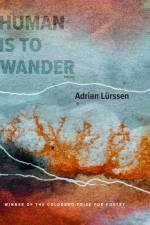av Adrian Lürssen
265,-
"If we are always at war, is all poetry then war poetry? Adrian Lèurssen's Human Is to wander is a book of dislocation, migration, and witness at a time of war-but whose war, fought where, and at what costs to whom? Born and raised in apartheid-era South Africa, Lèurssen migrated to the U.S. as a teen in order to avoid military service at a time when the country's authoritarian regime engaged in a protracted, largely unknown war in Angola. Years later, as a father of young children in his adopted country, echoes of everything his family thought they had left behind has returned: endless bloody conflicts on the horizon; an alarming rise of authoritarianism and nationalistic fervor; pervasive racism, inequality, and daily violence in a country whose mythic promise was once held as freedom, equality, opportunity. In Human Is to wander, Lèurssen explores these echoes of his personal history within a landscape that is familiar and unfamiliar all at once. Neither the brutally oppressive South Africa of his childhood nor the precarious United States of today, Lèurssen's landscape emerges in the broken rhyme between "troop" and "troupe" where "our captions / are picture less" and "the plan to explain is absolute, but only an entrance." His is an inner landscape as song no longer sung in a mother tongue, in which the human cost of war, climate crisis, and forced migration is "all part of the explanation." Lèurssen uses collage, constrained cut-up, Oulipean procedures, abecedarian, and other generative play to allow poems to emerge that respond to the turmoil and dislocation of this violent century, attempting to witness if not understand his-and our-place in it"--

